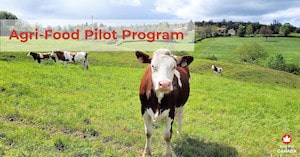Through the Agri-Food Pilot (AFP) Program, the federal government helps address the labour needs of the Canadian agri-food sector by providing a pathway to permanent residence for experienced, non-seasonal workers in specific agri-food industries and occupations.
Overview of the Agri-Food Pilot Program
The AFP is a pilot program launched in 2020 and is set to expire on May 14, 2025.
The specific allocation for the AFP is 2,750 applications per year, processed on a first-come, first-served basis.
A job offer is needed to be eligible for this pilot program, however, a labour market impact assessment (LMIA) is not required.
The specific allocation for the AFP is 2,750 applications per year, processed on a first-come, first-served basis.
A job offer is needed to be eligible for this pilot program, however, a labour market impact assessment (LMIA) is not required.
Eligible occupations and industries under the Agri-Food Pilot Program
To be eligible to the Agri-Food Pilot (AFP) Program, you must have eligible work experience and a job offer (outside Quebec) in an eligible industry and occupation.
Eligible industries (classified by the North American Industry Classification System (NAICS)) and eligible occupations are the following:
Eligible industries (classified by the North American Industry Classification System (NAICS)) and eligible occupations are the following:
- Meat product manufacturing (NAICS 3116):
- NOC 63201 - Butchers - retail and wholesale
- NOC 65202 - Meat cutters and fishmongers - retail and wholesale
- NOC 94141 - Industrial butchers and meat cutters, poultry preparers and related workers
- NOC 82030 - Agricultural service contractors and farm supervisors
- NOC 84120 - Specialized livestock workers and farm machinery operators
- NOC 85100 - Livestock labourers
- NOC 95106 - Labourers in food and beverage processing
- Greenhouse, nursery and floriculture production, including mushroom production (NAICS 1114) and Animal production, excluding aquaculture (Cattle ranching and farming (NAICS 1121), Hog and pig farming (NAICS 1122), Poultry and egg production (NAICS 1123), Sheep and goat farming (NAICS 1124), Other animal production (NAICS 1129)):
- NOC 82030 - Agricultural service contractors and farm supervisors
- NOC 84120 - Specialized livestock workers and farm machinery operators
- NOC 85100 - Livestock labourers
- NOC 85101 - Harvesting labourers
Applicant Eligibility criteria
Below is a summary of the eligibility requirement of the Agri-Food Pilot (AFP) Program:
1. Job Offer:
The following requirements must be met for the job offer:
If you are residing in Canada when you apply, you may choose to meet either this job offer requirement or the education requirement (see below).
If you are residing outside Canada, you will have to meet both the job offer and education requirements.
2. Work Experience:
In the last 3 years, you must have worked:
The following requirements apply:
3. Education:
The minimum education requirements are a Canadian high school diploma, or the equivalent outside Canada.
If you studied outside Canada, you need an Educational Credential Assessment (ECA). You can learn more about how to request an ECA here.
If you are residing in Canada when you apply, you may choose to meet either this education requirement or the job offer requirement (see above).
If you are residing outside Canada, you will have to meet both the job offer and education requirements.
4. Language proficiency:
The minimum language requirements is CLB5 for each of the four language ability : speaking, listening, reading and writing.
For more information on Canadian Language Benchmarks (CLB) and which language tests you are allowed to take, check this page.
5. Proof of funds:
You need to have enough money to support yourself and your family when you get to Canada. However, if you are already living and working in Canada with a valid work permit, you do not need to show proof of funds.
The funds required depend on the number of family members (including any dependents that will not immigrate with you). The funds must be yours and must not be borrowed. Below is a table with the required funds, last updated by IRCC on April 25, 2023.
1. Job Offer:
The following requirements must be met for the job offer:
- Must be in one of the eligible industries and occupations.
- Must be full time and non-seasonal, and permanent.
- Must have a wage :
- determined by the applicable collective agreement for unionized positions,
- that meets or exceeds the Job Bank’s prevailing (median) wage for the occupation in the province of employment (or at the national level if no provincial rate is available) for non-unionized positions.
- Must be outside Quebec.
If you are residing in Canada when you apply, you may choose to meet either this job offer requirement or the education requirement (see below).
If you are residing outside Canada, you will have to meet both the job offer and education requirements.
2. Work Experience:
In the last 3 years, you must have worked:
- in Canada at least 1,560 hours (equivalent to 1 year if you were working 30h/week),
- in one of the eligible industries and occupations,
- with a labour market impact assessment (LMIA) with a minimum 12-month duration (any work experience you gained while holding an open work permit does not count except with the open work permit for vulnerable workers).
The following requirements apply:
- Count hours worked full-time (can be in different eligible occupations and with different employers). The hours must have been worked over a total period of at least 12 months.
- Count only paid hours of work (volunteering or unpaid internships do not count).
- Don’t count hours when you were self-employed.
- Don't count hours when not authorized to work.
- Don't count hours worked in part-time or seasonal positions.
3. Education:
The minimum education requirements are a Canadian high school diploma, or the equivalent outside Canada.
If you studied outside Canada, you need an Educational Credential Assessment (ECA). You can learn more about how to request an ECA here.
If you are residing in Canada when you apply, you may choose to meet either this education requirement or the job offer requirement (see above).
If you are residing outside Canada, you will have to meet both the job offer and education requirements.
4. Language proficiency:
The minimum language requirements is CLB5 for each of the four language ability : speaking, listening, reading and writing.
For more information on Canadian Language Benchmarks (CLB) and which language tests you are allowed to take, check this page.
5. Proof of funds:
You need to have enough money to support yourself and your family when you get to Canada. However, if you are already living and working in Canada with a valid work permit, you do not need to show proof of funds.
The funds required depend on the number of family members (including any dependents that will not immigrate with you). The funds must be yours and must not be borrowed. Below is a table with the required funds, last updated by IRCC on April 25, 2023.
Minimum required funds (2023-2024)
Number of Family Members |
Funds Required (in Canadian dollars) |
1 |
13,757 CAD |
2 |
17,127 CAD |
3 |
21,055 CAD |
4 |
25,564 CAD |
5 |
28,994 CAD |
6 |
32,700 CAD |
7 |
36,407 CAD |
For each additional member |
3,706 CAD |
Application Procedure
When the eligibility requirements are met, you will need to apply for the Agri-Food Pilot Program online (you can apply on paper only if you can't apply online and require accommodations, including for a disability).
You must fill out application forms and upload documents such as the job offer, proof of work experience, education, language proficiency, etc. and pay the fees.
If you are currently working in Canada, you may be eligible to apply for a Bridging Open Work Permit. Your immediate family members (spouse, common-law partner and children) may also be eligible for an open work permit.
You must fill out application forms and upload documents such as the job offer, proof of work experience, education, language proficiency, etc. and pay the fees.
If you are currently working in Canada, you may be eligible to apply for a Bridging Open Work Permit. Your immediate family members (spouse, common-law partner and children) may also be eligible for an open work permit.
Application Fees
The application processing fee is $950 and the Right of Permanent Residence Fee (RPRF) is $575, making a total of $1,525 for a single applicant.
If you include a spouse/partner, you will have to pay the same fees twice, which makes it a total of $3,050 for a couple.
If you include a dependent child, you have to add $260 for each child.
Biometrics fees ($85 for one person, or maximum $170 for a family of more than two) will probably be added to your total. You can find more information on Biometrics in this page.
If you include a spouse/partner, you will have to pay the same fees twice, which makes it a total of $3,050 for a couple.
If you include a dependent child, you have to add $260 for each child.
Biometrics fees ($85 for one person, or maximum $170 for a family of more than two) will probably be added to your total. You can find more information on Biometrics in this page.
Processing Times
Immigration, Refugees and Citizenship Canada (IRCC) does not have a target service standard of processing for Agri-Food Pilot Program applications.
As of time of writing, the Agri-Food Pilot Program does not publish average processing times.
As of time of writing, the Agri-Food Pilot Program does not publish average processing times.



